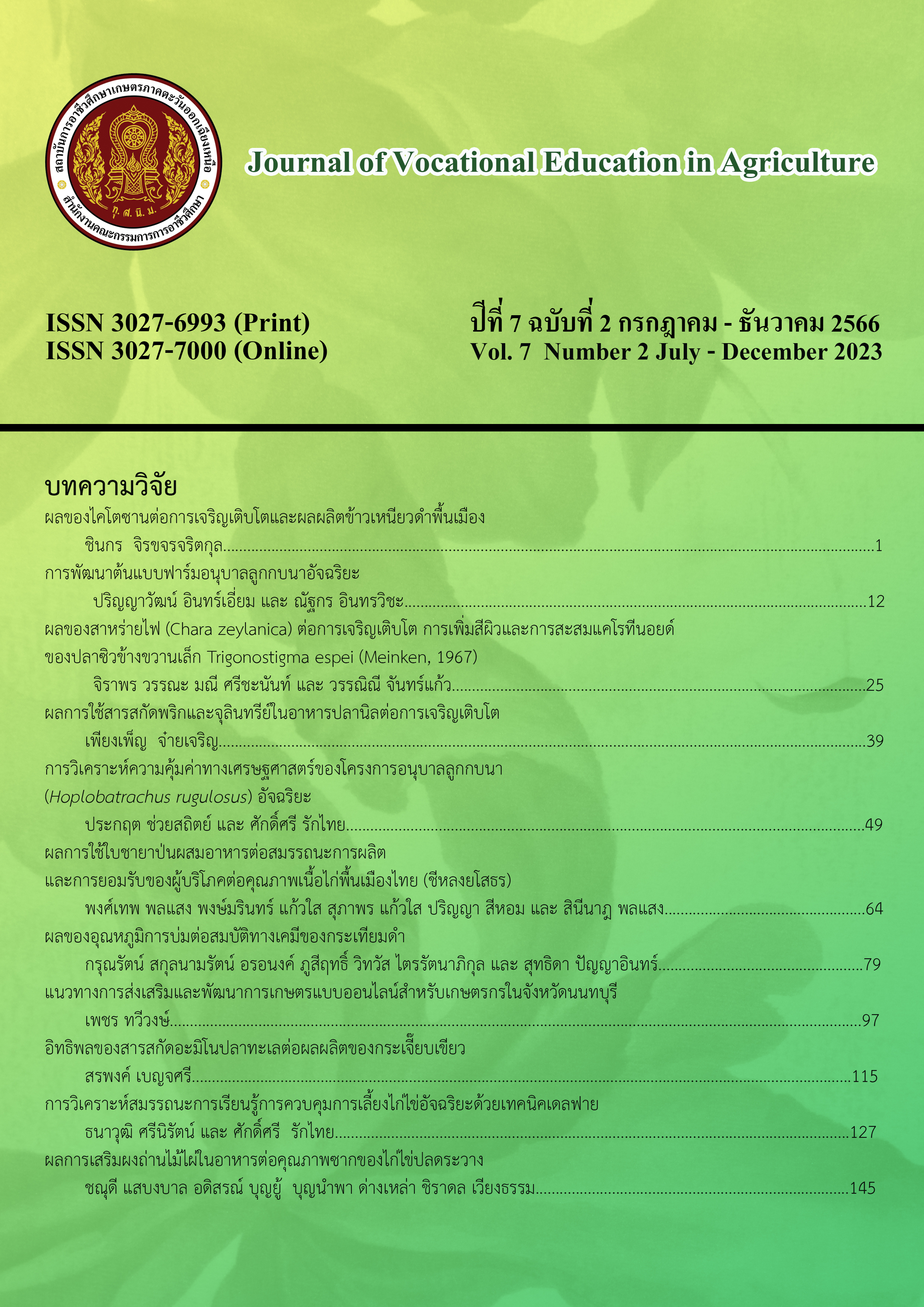Economic Worthiness Analysis of Smart Nursery Frog Project (Hoplobatrachus rugulosus)
Main Article Content
Abstract
The objective of this research was to compare economic worthiness of smart and traditional nursery frog projects. Both projects were 20 cement ponds with 2x3x0.8 meters. The research methods were defining and collecting costs and benefits of 15 project year with 9% discount rate, comparaing Net Present Value (NPV), Benefit Cost Ratio (BCR),Economic Internal Rate of Return (EIRR) and sensitivity of the smart and traditional nursery frog projects. The results found that the smart andtraditional nursery frog projectswere economicworthiness. The economic worthiness indicators of smart nursery frog projectwere Net Present Value (NPV) of 346,954.77 Baht, Benefit Cost Ratio (BCR) of 1.40, Economic Internal Rate of Return (EIRR) of 31.49%. The economic worthiness indicators oftraditional nursery frog projectwere Net Present Value (NPV) of 223,835.40 Baht, Benefit Cost Ratio (BCR) of 1.36 and Economic Internal Rate of Return (EIRR) of 25.30%.
Article Details

This work is licensed under a Creative Commons Attribution-NonCommercial-NoDerivatives 4.0 International License.
The content and information in articles published in the Journal of Vocational Education in Agriculture are the opinions and responsibility of the article's author. The journal editors do not need to agree or share any responsibility.
Articles, information, content, etc. that are published in the Journal of Vocational Education in Agriculture are copyrighted by the Journal of Vocational Education in Agriculture. If any person or organization wishes to publish all or any part of it or to do anything. Only prior written permission from the Journal of Vocational Education in Agriculture is required.
References
Fisheries Development Policy and Planning Division. (2022). Fisheries Statistics of Thailand 2020. Bangkok: Department of Fisheries. (in Thai)
Muanmueangsong, P., et al. (2014). Production and Marketing of Frog Farming in Mueang District, Loei Province. Prawarun Agricultural Journal, 11(1), 65-72. (in Thai)
Maklon, M., et al. (2021). Optimal feed types for costreductionsof African catfish (Clarias gariepinus) culture inland-based cages. Agriculture and Technology Journal, 2(1), 37-49. (in Thai)
Thongklongsye, T., et al. (2011). The Development Project of Frog Culture Method with Sulfficiency Economy Philosophy. RMUTI Journal, 4(1), 10-18. (in Thai)
Kurithong, W. (2011). The Measurment of Technical Efficiency White Shrimp Litopenaeus Vanamei. (Master thesis, Srinakharinwirot University). (in Thai)
Poonpol, P. & Phoochinda, W. (2021). Social Return on Investment of the Snakeskin Gourami (Plasalid) Farming in Bang Bo District, Samut Prakan Province to Become Smart Farmer. Rajabhat Rambhai Barni Research Journal, 15(1). 108-118. (in Thai)
Suwitthayaporn, I. (2015). The Study of Costs and Returns of Tilapia Culture Investment in Suitable Commercial Area for Tilapia Culture in Phitsanulok Province (Research reports). Bangkok: Department of Fisheries. (in Thai)
Bangbai, B. & kleebprayoon, K. (2020). Comparison of Costs and Returns of Investment in Shrimp Farming between Monoculture and Polyculture Farming. Journal of Industrial Business Administration, 2(1), 4-20. (in Thai)
Rittichai, T. & Sonpakdee, C. (2022). Making Decisions for Investment in Polyculture Farming of Giant Freshwater Prawns and Litopenaeus vannamei in Soil Ponds Owned by Farmers in Kamphaeng Saen, Nakhon Pathom. Journal of Southern Technology, 15(1), 95-109. (in Thai)
Wanichwiriyakit, W. (2020). The Feasibility Analysis of White Shrimp Farming with Bio-Secure System in Chonthaburi Province. Journal of Social Science Panyapat, 2(1), 1-8. (in Thai)
Oniam, V., et al. (2018). Financial Analysis of Pacific White Shrimp (Litopenaeus vannamei) Culture in Earthen Pond: Case Study of Klongwan Models. Journal of Agriculture, 34(3), 501-511. (in Thai)
Ueasin, N. & Duangmanee, C. (2021). Cost and Benefit of Tilapia Farming in the Cage Along the Mekhong River (Nong Khai Province) During the Production Year of 2019. Journal of Business, Economics and Communications, 16(3), 144-162. (in Thai)
Muktichard, P., et al. (2020). Marketing Channel and Financial Feasibility of Oyster Farm Investment in Kanchanadit District, Surat Thani Province. WMS Journal of Management, 9(1), 25-36. (in Thai)
Uydam, Y., et al. (2021). Knowledge Capturing on rising Hoplobatrachus rugulosus. Pathumthani: Rangsit University Press. (in Thai)
Nakhonsithammarat College of Agriculture and Technology. (2021). Government action plan of fiscal year 2021. Available from https://sites.google.com/a/svia.ac.th. Accessed date: 10 July 2022. (in Thai)
The worldbank. (2022). Lending interest rate. Available from https://databank. worldbank.org. Accessed date: 8 September 2022. (in Thai)
Comptroller General's Department. (2014). Criteria for calculating depreciation of fixed assets for government agencies. Bangkok: Comptroller General's Department. (in Thai)
Piputsitee, C. (2001). Economics of Project Analysis. Bangkok: Kasetsart University. (in Thai)
Punsri, J. & Promsaka Na Sakolnakorn, T. (2019). Prototype Greenhouse (Smart Farm) for community enterprise management (Senior Project). Chiangmai: Chiangmai University. (in Thai)
Ruangkarn, R., et al. (2021). The System Controls Environment of Earthworm with IoT Platform. Princess of Naradhiwas University Journal, 13(3), 294-307. (in Thai)
Manwicha, J. (2016). Smart Farms Technology. Hatyai Academic Journal, 14(2), 201-210. (in Thai)
Maheswari, R., et al. (2008). Precision farming technology, adoption decisions and productivity of vegetables in resource-poor environments. Agricultural Economics Research Review, 21, 415-424.
Promsuwan, P. & Maewang, J. (2020). Cost-Benefit Analysis of Crab Aquaculture in Marine and Brackish Water: A Case Study in Moo 4, Banpatay, Wang Won Sub-district, Kantang District, Trang Province. Economics and Business Administration Journal Thaksin University, 12(1), 15-28. (in Thai)
Wechakama, T., et al. (2012). Cost-Benefit Analysis of Sea Bass Culture: Case Study of Sea Bass Culturein Prachuap Khiri Khan Province. Journal of Fisheries Technology Research, 6(1), 103-114. (in Thai)

